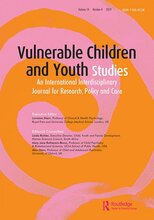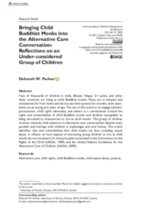childrens_living_arrangement
children_living_without_bio
Displaying 91 - 100 of 427
The purpose of this article is to describe the process of testing and piloting the UNICEF protocol on children in residential care in three countries: India, Ghana, and Kazakhstan.
The strengths-based assessment tool serves to both prevent family breakdowns and reintegrate children from institutions back into families (or other family-based or alternative care options). This article provides an overview of the tool, including its purpose, set-up and functionality within a case management system.
The second wave of COVID-19 ruptured families across India. Despite widespread media coverage, the conversation overlooked a demographic worst affected by it, namely children.
These presentations from Hope and Homes for Children, Miracle Foundation and Railway Children were delivered during the August 20, 2021, workshop of the Care Measurement Task Force of the Transforming Children's Care Global Collaborative Platform. The focus of the workshop was child and family outcome measurement.
"A two-day old baby born to daily wage workers in India's western state of Gujarat was kidnapped not once but twice," says this article from BBC News which investigates how and why.
This article from the Indian Express shares the stories of very young children in the state of Punjab, India who have been orphaned by the COVID-19 pandemic.
According to this article from CNN, there are "at least 577 Indian children who lost both parents to Covid between April 1 and May 25, when India was battling its second wave of the outbreak, according to government figures."
The plight of so-called "COVID orphans," children who've lost one or both parents to COVID-19, "is one of the heartbreaking pandemic developments to emerge from India, which in May recorded the greatest number of deaths in one country in one month from COVID 19: over 120,000," says this article from NPR.
In this video, "CNN's Vedika Sud speaks to the eldest sister-- now the primary caretaker of a family of seven siblings who lost their mother and then their father to the brutal second wave."
This article identifies risks and vulnerabilities that child monks can face, including sexual abuse. It reflects on how aspects of entrusting young children to live as child monks do not necessarily fit with principles articulated in the Convention on the Rights of the Child (UNGA, 1989) and the United Nations Guidelines for the Alternative Care of Children (UNGA, 2009).


